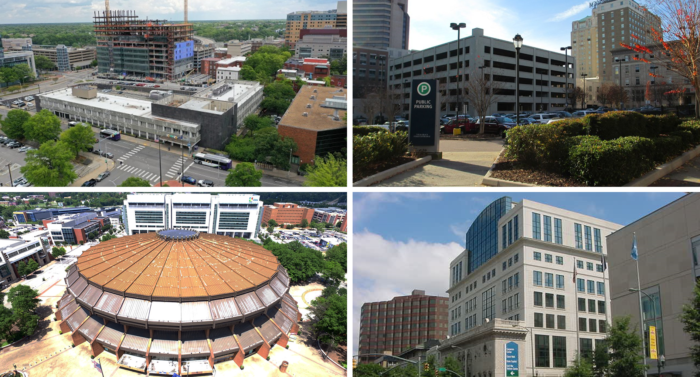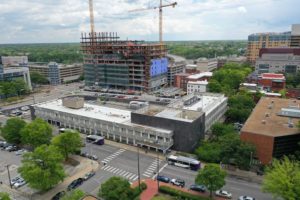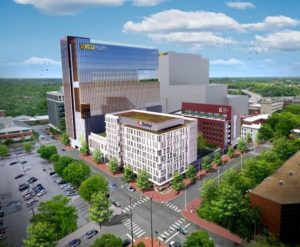
Four of the city-owned properties set to be declared surplus, clockwise from top left: the Public Safety Building at Ninth and Leigh streets; the parking lot at 609 E. Grace St.; the Theatre Row Building on Broad Street; the Coliseum. (BizSense file and submitted photos)
After receiving two offers on city-owned properties once tied to the failed Navy Hill project, Richmond administrators are delaying a proposed surplus-property designation as they plan to rework it around one of those offers in particular.
A scheduled vote on the surplus property designation was held off at Tuesday’s City Council meeting, as administrators said they’re amending the proposal to “split out” one of the parcels – the Public Safety Building property at 500 N. 10th St., which is the focus of one of the two unsolicited offers that the city has received since Navy Hill was voted down.
In an agenda meeting that preceded council’s regular session, Economic Development Director Leonard Sledge informed council of the delay in response to questions from member Kristen Larson, who asked the status of two other steps needing to be taken before council can consider the unsolicited offers as part of a broader solicitation of proposals from developers.
Sledge said one of those steps, an appraisal of the properties, is underway, with appraisals due back the first week of June. The other step Larson asked about – a so-called “small area plan” of the city-owned properties around and including the Richmond Coliseum – was not detailed in the meeting.

The Public Safety Building as viewed along Ninth Street, with the under-construction VCU Health outpatient building looming behind it. (Capital City Partners)
Dividing the Public Safety Building property out from the others would allow the city to pursue a request for proposals specific to that property without involving the other properties that were set to be deemed surplus. While it remains council’s call on whether to pursue multiple RFPs or one overarching one, separating the Public Safety Building would free it up to be declared surplus individually.
The Public Safety Building is the focus of the most recently received offer, from Capital City Partners, the development team that was enlisted for Navy Hill. It proposes replacing the building with a mixed-use office complex, highlighted with a 20-story tower that would be leased by VCU Health.
The $350 million project, totaling 545,000 square feet, is a variation of what was known as “Block D” in the Navy Hill project, but with the now-taller tower that would accommodate an additional 150,000 square feet of Class A office space. A tenant for that space isn’t named in CCP’s proposal, which describes the space as spec and “designed to attract new business to downtown Richmond.”

A rendering of the proposed office tower and complex that would replace the Public Safety Building. (Courtesy Capital City Partners)
Navy Hill as a whole had the support of Mayor Levar Stoney’s administration, which is initiating the surplus property designations. City Council remained divided on the $1.5 billion project, with a majority voting it down by a 5-4 vote in February. Prior to the vote, council adopted a resolution mapping out next steps to be taken, including the surplus designation, appraisals and area plan.
Earlier Tuesday, councilmember Kim Gray, one of Navy Hill’s more vocal opponents, issued a statement questioning the surplus designation proposal and calling for more review. Gray is challenging Stoney for the mayor’s seat in this fall’s elections.
Responding to Gray during the meeting, Sledge said council would still be able to vet CCP’s offer and would have final say over any development proposal.
“Just because they offer it doesn’t mean that that’s what we have to accept,” Sledge said.
The other properties proposed to be deemed surplus include the Coliseum, a parking lot across Clay Street from the John Marshall Courts Building, and two city-owned sites south of Broad Street that were initially part of Navy Hill but later removed: a parking lot at 401 E. Broad St., and the bulk of the city block at 609 E. Grace St.
Also included in the mix is the Theatre Row Building at 730 E. Broad St., the only property involved that was not tied to Navy Hill. The 10-story, 166,000-square-foot office building houses the city’s Richmond Gas Works public utilities department, as well as space used by VCU’s School of Medicine.
The city has received one other unsolicited offer: from D.C.-based Douglas Development, which wants to purchase nearly 15 acres of the Navy Hill project area for $15 million in cash. The company, led by developer Douglas Jemal, said it planned to refurbish the shuttered Coliseum and develop the rest of the land with a mix of residential, office, retail and hotel uses.
Short-term rental rules delayed
Also on Tuesday, council delayed for 30 days a vote on proposed rules for short-term home rentals in the city.
During the earlier special meeting, several council members questioned the latest version of the proposal, which would have prohibited rental properties that were not an operator’s primary residence.
Gray, who took part in stakeholder meetings over the past several months, described the policy as a starting point to make at least those rentals legal. The rules have been in the works for several years, with considerable public input over the past 12 months.
But some of her colleagues, including Stephanie Lynch and Ellen Robertson, asked for more time to consider other localities’ policies, contending that the primary residency requirement would prohibit a significant number of rentals in the city.
“I can’t stress enough how big of a sea change this is for Richmond,” Lynch said of the proposal. “The way this is structured, this will wipe out an entire business model in the city of Richmond.”
Contending that not all rental operators in the city are “bad actors,” Lynch said, “We will erase that business model and the ability to generate (tax) revenue and those folks’ livelihoods.”
Gray maintained that the policy was a starting point that the city would revisit after a year of implementation. Stating she agreed with Lynch in principle, Gray said, “This at least gets a large portion of the operators in compliance, and then we can tackle the non-owner-occupied rentals as we proceed.”
“I do think there is a way to get there; I just don’t think that holding this up will get us there any more quickly,” Gray said.
Following Lynch’s motion, council voted to delay the vote until its June 22 meeting, with member Chris Hilbert the lone dissenting vote.

Four of the city-owned properties set to be declared surplus, clockwise from top left: the Public Safety Building at Ninth and Leigh streets; the parking lot at 609 E. Grace St.; the Theatre Row Building on Broad Street; the Coliseum. (BizSense file and submitted photos)
After receiving two offers on city-owned properties once tied to the failed Navy Hill project, Richmond administrators are delaying a proposed surplus-property designation as they plan to rework it around one of those offers in particular.
A scheduled vote on the surplus property designation was held off at Tuesday’s City Council meeting, as administrators said they’re amending the proposal to “split out” one of the parcels – the Public Safety Building property at 500 N. 10th St., which is the focus of one of the two unsolicited offers that the city has received since Navy Hill was voted down.
In an agenda meeting that preceded council’s regular session, Economic Development Director Leonard Sledge informed council of the delay in response to questions from member Kristen Larson, who asked the status of two other steps needing to be taken before council can consider the unsolicited offers as part of a broader solicitation of proposals from developers.
Sledge said one of those steps, an appraisal of the properties, is underway, with appraisals due back the first week of June. The other step Larson asked about – a so-called “small area plan” of the city-owned properties around and including the Richmond Coliseum – was not detailed in the meeting.

The Public Safety Building as viewed along Ninth Street, with the under-construction VCU Health outpatient building looming behind it. (Capital City Partners)
Dividing the Public Safety Building property out from the others would allow the city to pursue a request for proposals specific to that property without involving the other properties that were set to be deemed surplus. While it remains council’s call on whether to pursue multiple RFPs or one overarching one, separating the Public Safety Building would free it up to be declared surplus individually.
The Public Safety Building is the focus of the most recently received offer, from Capital City Partners, the development team that was enlisted for Navy Hill. It proposes replacing the building with a mixed-use office complex, highlighted with a 20-story tower that would be leased by VCU Health.
The $350 million project, totaling 545,000 square feet, is a variation of what was known as “Block D” in the Navy Hill project, but with the now-taller tower that would accommodate an additional 150,000 square feet of Class A office space. A tenant for that space isn’t named in CCP’s proposal, which describes the space as spec and “designed to attract new business to downtown Richmond.”

A rendering of the proposed office tower and complex that would replace the Public Safety Building. (Courtesy Capital City Partners)
Navy Hill as a whole had the support of Mayor Levar Stoney’s administration, which is initiating the surplus property designations. City Council remained divided on the $1.5 billion project, with a majority voting it down by a 5-4 vote in February. Prior to the vote, council adopted a resolution mapping out next steps to be taken, including the surplus designation, appraisals and area plan.
Earlier Tuesday, councilmember Kim Gray, one of Navy Hill’s more vocal opponents, issued a statement questioning the surplus designation proposal and calling for more review. Gray is challenging Stoney for the mayor’s seat in this fall’s elections.
Responding to Gray during the meeting, Sledge said council would still be able to vet CCP’s offer and would have final say over any development proposal.
“Just because they offer it doesn’t mean that that’s what we have to accept,” Sledge said.
The other properties proposed to be deemed surplus include the Coliseum, a parking lot across Clay Street from the John Marshall Courts Building, and two city-owned sites south of Broad Street that were initially part of Navy Hill but later removed: a parking lot at 401 E. Broad St., and the bulk of the city block at 609 E. Grace St.
Also included in the mix is the Theatre Row Building at 730 E. Broad St., the only property involved that was not tied to Navy Hill. The 10-story, 166,000-square-foot office building houses the city’s Richmond Gas Works public utilities department, as well as space used by VCU’s School of Medicine.
The city has received one other unsolicited offer: from D.C.-based Douglas Development, which wants to purchase nearly 15 acres of the Navy Hill project area for $15 million in cash. The company, led by developer Douglas Jemal, said it planned to refurbish the shuttered Coliseum and develop the rest of the land with a mix of residential, office, retail and hotel uses.
Short-term rental rules delayed
Also on Tuesday, council delayed for 30 days a vote on proposed rules for short-term home rentals in the city.
During the earlier special meeting, several council members questioned the latest version of the proposal, which would have prohibited rental properties that were not an operator’s primary residence.
Gray, who took part in stakeholder meetings over the past several months, described the policy as a starting point to make at least those rentals legal. The rules have been in the works for several years, with considerable public input over the past 12 months.
But some of her colleagues, including Stephanie Lynch and Ellen Robertson, asked for more time to consider other localities’ policies, contending that the primary residency requirement would prohibit a significant number of rentals in the city.
“I can’t stress enough how big of a sea change this is for Richmond,” Lynch said of the proposal. “The way this is structured, this will wipe out an entire business model in the city of Richmond.”
Contending that not all rental operators in the city are “bad actors,” Lynch said, “We will erase that business model and the ability to generate (tax) revenue and those folks’ livelihoods.”
Gray maintained that the policy was a starting point that the city would revisit after a year of implementation. Stating she agreed with Lynch in principle, Gray said, “This at least gets a large portion of the operators in compliance, and then we can tackle the non-owner-occupied rentals as we proceed.”
“I do think there is a way to get there; I just don’t think that holding this up will get us there any more quickly,” Gray said.
Following Lynch’s motion, council voted to delay the vote until its June 22 meeting, with member Chris Hilbert the lone dissenting vote.


